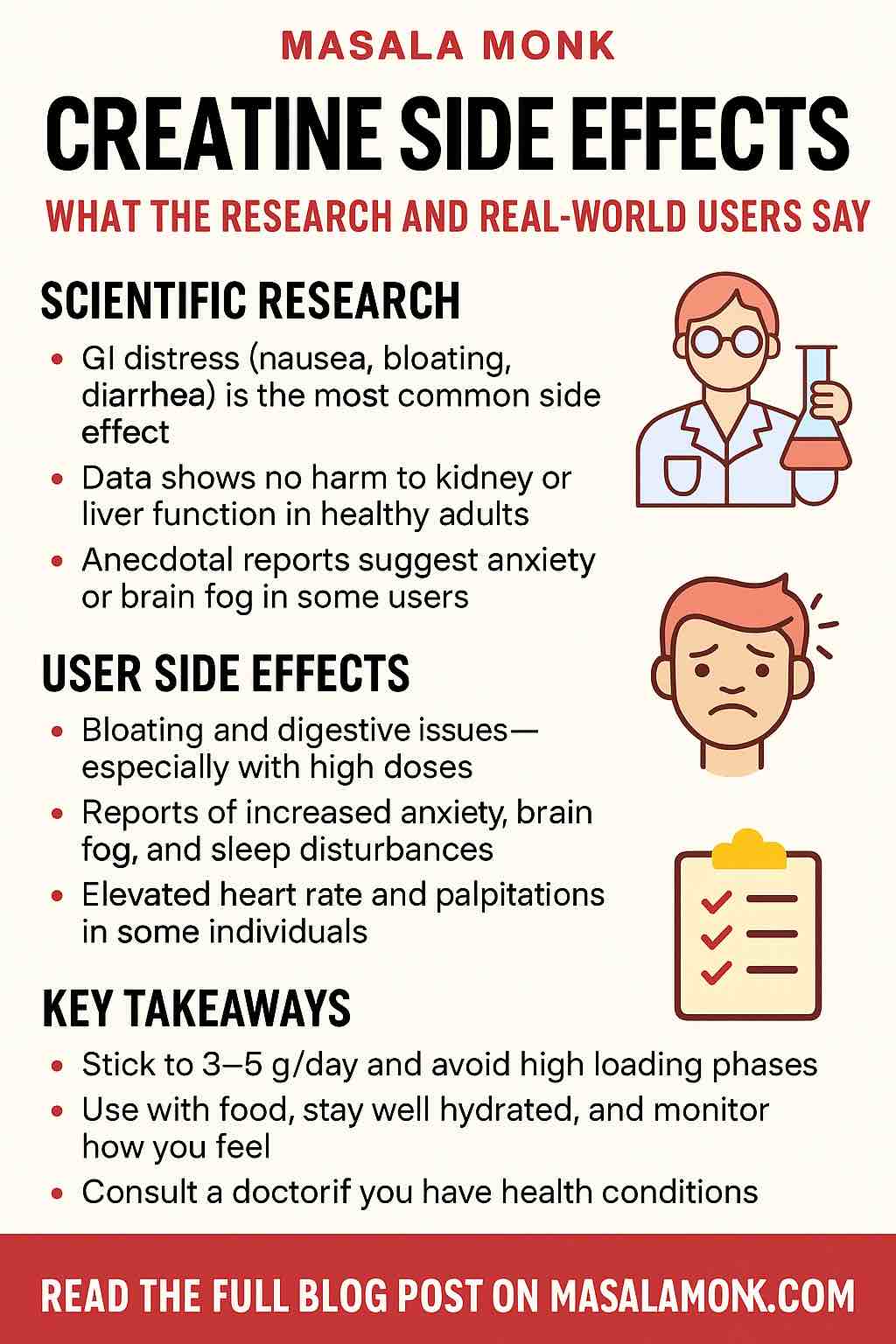
Creatine has long held the spotlight in the fitness and sports nutrition world, hailed for its ability to enhance muscle mass, strength, and performance. But as its popularity has surged among both athletes and everyday fitness enthusiasts, so too have concerns about its potential side effects. Is creatine really as safe as claimed? Or are there hidden downsides masked by its benefits?
In this detailed blog post, we’ll examine the most up-to-date clinical research as of 2025, compare that with real user experiences, and offer practical strategies to safely supplement creatine while minimizing risks. Whether you’re already taking creatine or just considering it, this guide will give you the nuanced understanding you need.
🔬 The Scientific Verdict: Creatine Is Largely Safe
A sweeping 2025 meta-analysis encompassing 685 clinical trials and over 25,000 participants has added significant weight to the scientific consensus: creatine is safe for healthy adults when used at recommended doses. In this landmark review, the incidence of side effects among creatine users (13.7%) was nearly identical to that of placebo users (13.2%).
This mirrors decades of smaller studies and expert opinions, such as those from the International Society of Sports Nutrition (ISSN), which affirm creatine’s safety profile across multiple health markers—especially when consumed as creatine monohydrate at 3–5 g/day.
However, “safe” doesn’t mean free from all side effects—particularly in individuals with certain sensitivities or preexisting health conditions. Let’s break this down in more detail.
🫰 Commonly Reported Side Effects (and What Science Says)
1. Gastrointestinal Discomfort
Clinical finding: Mild bloating, cramping, or diarrhea is the most frequently reported side effect, especially during high-dose loading phases (20 g/day).
User experience: Many Reddit and forum users report upset stomachs, gas, and nausea—particularly when taking creatine on an empty stomach.
Prevention tips:
- Stick to 3–5 g/day; skip the loading phase.
- Take with meals to improve tolerance.
- Use micronized creatine monohydrate for better solubility.
2. Water Retention and Temporary Weight Gain
Clinical finding: Creatine draws water into muscle cells, leading to an initial weight increase of 1–2 kg. Long-term studies find no impact on total body water balance.
User experience: Many users report feeling “puffy” or bloated early in supplementation, but often note this dissipates over time.
Reality check: This is intramuscular water, not fat gain, and often enhances muscle fullness.
3. Sleep Disturbances and Night Sweats
Clinical finding: Largely anecdotal, with no confirmed link in clinical trials.
User experience: A noticeable subset report insomnia, vivid dreams, or night sweats—especially when dosing late in the day.
Prevention tips:
- Take creatine earlier in the day.
- Stay well hydrated.
4. Mood Effects, Anxiety, and Brain Fog
Clinical finding: Some evidence suggests creatine may help with cognitive function and mood in depression, but there are mixed reports in otherwise healthy users.
User experience: Some users describe brain fog, emotional dullness, or worsened anxiety—potentially linked to creatine’s role in brain energy metabolism or methylation pathways.
Caution: Those with a history of anxiety or bipolar disorder should consider starting with lower doses and consulting a healthcare provider.
5. Heart Rate & Palpitations
Clinical finding: No reliable evidence of cardiovascular stimulation.
User experience: A few individuals report increased heart rate or mild palpitations, which may be secondary to dehydration or anxiety rather than creatine itself.
Tip: Ensure proper hydration and evaluate for other confounding factors like caffeine intake.
🧬 The Most Debunked Myths About Creatine
- Kidney Damage: No evidence supports kidney damage in healthy users at standard doses—even in long-term studies up to 5 years.
- Liver Damage: Similarly, liver enzymes remain stable in clinical evaluations.
- Hair Loss & Acne: No direct mechanistic link exists, though speculation around increased DHT remains unproven.
- Cramping & Dehydration: In fact, some studies show fewer cramps due to enhanced muscle hydration.
- Rhabdomyolysis: Creatine is not linked to rhabdomyolysis in healthy users; risk is more associated with extreme training or other medications.
🧰 Who Should Be Cautious?
- Individuals with Preexisting Kidney Conditions: Always consult a physician.
- Those with Bipolar Disorder or Mood Instability: Some case studies link creatine to manic episodes.
- Adolescents: Safe use is possible, but long-term data is still emerging.
- Pregnant or Breastfeeding Individuals: Insufficient evidence for safety.
⚡ Best Practices to Minimize Side Effects
- Use a pure, micronized creatine monohydrate with third-party certification (e.g., NSF, Informed Sport).
- Stick to 3–5 g/day—no need to load unless under guidance.
- Take with a carb-rich meal to aid absorption and minimize GI issues.
- Hydrate consistently, especially during workouts.
- Avoid combining with stimulants if you’re sensitive to heart rate changes.
📊 Summary: Creatine Is Effective and Mostly Safe, But Not for Everyone
Creatine remains one of the most well-researched and effective supplements available—offering real benefits for muscle growth, performance, and even cognitive health. The risks? Generally mild and avoidable for most people, particularly when used responsibly. But it’s clear from both research and user reports that some individuals may experience side effects—especially when underlying health issues or poor supplementation practices are at play.
As with any supplement, personalization is key. Start low, monitor how you feel, and adjust as needed.
Have you experienced side effects from creatine, or found a strategy that worked for you? Share your insights in the comments—we’d love to hear from real users and keep the conversation evidence-informed and grounded in real-world use.
🔍 10 Frequently Asked Questions (FAQs)
1. Is creatine safe for long-term use?
Yes, long-term studies (up to 5 years) show no adverse effects in healthy individuals when taking recommended doses (3–5 g/day). Kidney and liver function remain unaffected.
2. What are the most common side effects of creatine?
The most frequently reported side effects are bloating, mild stomach discomfort, and temporary water retention—mostly during loading phases or when taken without food.
3. Can creatine cause anxiety or brain fog?
While rare, some users report increased anxiety or mental cloudiness. There’s limited scientific evidence, but people with anxiety disorders should start with lower doses and monitor their response.
4. Does creatine affect sleep or cause night sweats?
Clinical data doesn’t support a link, but anecdotal reports suggest it might in some individuals. Taking it earlier in the day and staying hydrated may help.
5. Is creatine bad for your kidneys?
No. Numerous studies confirm that creatine does not harm kidney function in healthy users. Those with pre-existing kidney issues should consult a healthcare provider first.
6. Can creatine worsen acid reflux or heartburn?
There’s no strong evidence, but a few users report increased reflux. Taking creatine with food and avoiding high doses may reduce this possibility.
7. Is it necessary to do a loading phase with creatine?
No. While loading (20 g/day for 5–7 days) saturates muscles faster, daily intake of 3–5 g reaches the same levels within 3–4 weeks and has fewer side effects.
8. Will creatine make me gain fat or look bloated?
Creatine increases water content in muscle cells, not fat. Some early bloating may occur, but it typically subsides and muscle definition often improves.
9. Are there differences in side effects between creatine monohydrate and other forms?
Creatine monohydrate is the most studied and generally best tolerated. Other forms (e.g., HCL, ethyl ester) claim better absorption but lack robust data and may not reduce side effects.
10. Can teenagers safely use creatine?
Some research supports safe use in adolescents involved in supervised athletic programs, but long-term safety data is limited. Parental guidance and medical consultation are advised.










